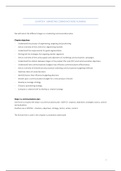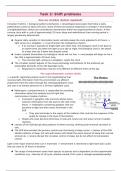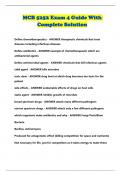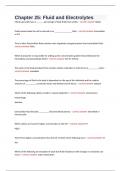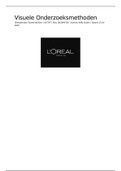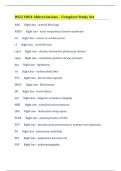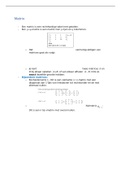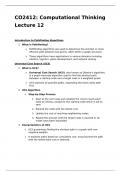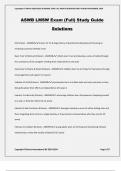CHAPTER 4 : MARKETING COMMUNICATIONS PLANNING
We will look at the different stages in a marketing communications plan.
Chapter objectives
- Understand the process of segmenting, targeting and positioning
- Get an overview of the criteria for segmenting markets
- Understand the requirements for good segmentation
- Distinguish the strategies for targeting market segments
- Get an overview of the various goals and objectives of marketing communications campaigns
- Understand the relation between stages in the product life cycle (PLC) and communication objectives
- Understand how communications budgets may influence communications effectiveness
- Get an overview of theoretical and practical marketing communications budgeting methods
- Optimise share-of-voice decisions
- Identify factors that influence budgeting decisions
- Decide upon a communications budget for a new product of brand
- Develop a message strategy
- Choose a positioning strategy
- Compose a creative brief to develop a creative strategy
Steps in a communications plan
One form to visualise the steps in a communications plan : SOSTCE : situation, objectives, strategies, tactics, control
and evaluation.
Another one is SOSTAC : situation, objectives, strategy, tactics, action, control.
The format that is used in this chapter is presented underneath.
1
,- Analysis : where are we and why to communicate.
- Situation analysis : what is the industry situation, competitive situation, customer situation.
- Target group : whom are we going to talk to?
- Strategy : what to say to whom to achieve what and at what cost.
- Target group : whom to talk to and how to decide upon that and how to find them?
- Objectives : what is the goal of the campaign, at what end goal are wa aiming?
- Budgets : what does it cost and what could it cost.
- Tactics : how to do it.
- Message and creative strategies : how are we going to achieve the objectives towards the target
group? How are we going to bring the message in a creative way?
- Tools and touch points : which channels, media are we going to use? Sales promotions, PR,
television...?
- Control : how well have we done and what should we change?
- Evaluation : we are going to measure the effect of the campaign.
- Control : we are going to change things and then we do everything again.
There is a strict consistency, coherence between objectives and evaluation. You set a number of objectives (e.g.
increase brand awareness and market share) and the evaluation stage you are going to measure these objectives.
So these are two sides of the same coin. When the campaign reaches its objectives, it is successful.
2
,Situation analysis
Marketing communications have to be embedded in the overall marketing strategy of the company, which, in turn,
has to be consistent with the corporate or business plan. The situation analysis or situation audit, including
strategic communications research, will partially overlap with strategic marketing research. The situation analysis
enables the communications manager to establish a solid
This is what you definitely should keep in mind when making a marketing communications campaign.
- Marketing objectives
Every marketing communication campaign fits into marketing plan and a marketing plan fits in a business
plan. It should fit in one another.
- Products and brands to be communicated
If you are a multi-brand or multi-product company, you should decide about what you are going to do a
campaign. What are their unique strengths and weaknesses, what is the unique selling proposition...
- Markets and target groups
The market can be whole Belgium, or Antwerp... and the target group can be young people, old people,
females...
- Competitors
Who are our competitors for these markets and target groups and for these products and brands. How do
they behave, how do they communicate, how much money do they spent...?
- Macro-environment
SWOT-analysis, opportunities and threats with respect to macro-factors : cultural, political, technological,
legal... You have to do a bit of environment analysis.
PEST model :
- Political and legal restrictions or regulations
- Economic situation
- Sociological concerns
- Technological evolutions
- Communications audit
See next title.
- Competitor communications strategy research
Very important! You should have an idea of what your competitors are doing and how. What is their plan?
What is their creative approach? Not to imitate, but to differentiate from them. Or to take the good things
from their campaign and enhance these elements in your campaign. ~ communications audit for the company
3
, - Communications content research: brainstorming, thought-starter lists,...
It is used to help communications creatives generate ideas about the content of new communications stimuli.
Thought-starter list = a list that an advertiser makes and gives to his communication agency, in which a
multitude of potential benefits of the brand or product to be promoted is listed. It can be the start of the
agency to develop messages and creative strategies. It can include elements like our product is cheap, it is
tasty according to tests, mainly young men use it, it sells best in discount-stores...
It may be when a new campaign has to be started, but it can also be used to get the process underway.
Communications audit
Brand A Brand B Brand C Corporate
TV advertising
Newspaper advertising
Online communication
Magazine advertising
Sales promotions
Direct mail
In-store communications
Front desk staff
Public relations material
Publicity
Sponsorship
The rows are touch-points, channels for media, tools, instrument... which you can use in a communications
campaign or that are relevant in communications. You can use different tools for different brands...
The columns let you check the consistency across the tools, so vertically, the consistency of all tools and
instruments used to communicate about a brand is investigated to assess to what extent the actual
communication efforts are truly integrated.
You put in a communications audit all the materials together that you use to communicate for brand A and you
check to what extent all these tools give a consistent brand image. Is your TV ad not too different from your
newspaper ad? Is there a consistent communication? You can do the same for brand B, brand C and the corporate
image. If we present ourselves as a formal suit-wearing company on television, is our front desk staff also wearing
a suit?
You could also check horizontally : you check to what extent your TV ads are consistent across all the different
brands and the corporate. This only makes sense if you are a monolithic company, e.g. a Bank, where your different
products are checked for consistency. It should have the same look and feel. It doesn’t make sense when you don’t
have a monolithic company, e.g. you have pampers and washing powder, then it doesn’t make sense to do it
horizontally.
This is very interesting when you want to make a new campaign or you want to brief an agency.
4
We will look at the different stages in a marketing communications plan.
Chapter objectives
- Understand the process of segmenting, targeting and positioning
- Get an overview of the criteria for segmenting markets
- Understand the requirements for good segmentation
- Distinguish the strategies for targeting market segments
- Get an overview of the various goals and objectives of marketing communications campaigns
- Understand the relation between stages in the product life cycle (PLC) and communication objectives
- Understand how communications budgets may influence communications effectiveness
- Get an overview of theoretical and practical marketing communications budgeting methods
- Optimise share-of-voice decisions
- Identify factors that influence budgeting decisions
- Decide upon a communications budget for a new product of brand
- Develop a message strategy
- Choose a positioning strategy
- Compose a creative brief to develop a creative strategy
Steps in a communications plan
One form to visualise the steps in a communications plan : SOSTCE : situation, objectives, strategies, tactics, control
and evaluation.
Another one is SOSTAC : situation, objectives, strategy, tactics, action, control.
The format that is used in this chapter is presented underneath.
1
,- Analysis : where are we and why to communicate.
- Situation analysis : what is the industry situation, competitive situation, customer situation.
- Target group : whom are we going to talk to?
- Strategy : what to say to whom to achieve what and at what cost.
- Target group : whom to talk to and how to decide upon that and how to find them?
- Objectives : what is the goal of the campaign, at what end goal are wa aiming?
- Budgets : what does it cost and what could it cost.
- Tactics : how to do it.
- Message and creative strategies : how are we going to achieve the objectives towards the target
group? How are we going to bring the message in a creative way?
- Tools and touch points : which channels, media are we going to use? Sales promotions, PR,
television...?
- Control : how well have we done and what should we change?
- Evaluation : we are going to measure the effect of the campaign.
- Control : we are going to change things and then we do everything again.
There is a strict consistency, coherence between objectives and evaluation. You set a number of objectives (e.g.
increase brand awareness and market share) and the evaluation stage you are going to measure these objectives.
So these are two sides of the same coin. When the campaign reaches its objectives, it is successful.
2
,Situation analysis
Marketing communications have to be embedded in the overall marketing strategy of the company, which, in turn,
has to be consistent with the corporate or business plan. The situation analysis or situation audit, including
strategic communications research, will partially overlap with strategic marketing research. The situation analysis
enables the communications manager to establish a solid
This is what you definitely should keep in mind when making a marketing communications campaign.
- Marketing objectives
Every marketing communication campaign fits into marketing plan and a marketing plan fits in a business
plan. It should fit in one another.
- Products and brands to be communicated
If you are a multi-brand or multi-product company, you should decide about what you are going to do a
campaign. What are their unique strengths and weaknesses, what is the unique selling proposition...
- Markets and target groups
The market can be whole Belgium, or Antwerp... and the target group can be young people, old people,
females...
- Competitors
Who are our competitors for these markets and target groups and for these products and brands. How do
they behave, how do they communicate, how much money do they spent...?
- Macro-environment
SWOT-analysis, opportunities and threats with respect to macro-factors : cultural, political, technological,
legal... You have to do a bit of environment analysis.
PEST model :
- Political and legal restrictions or regulations
- Economic situation
- Sociological concerns
- Technological evolutions
- Communications audit
See next title.
- Competitor communications strategy research
Very important! You should have an idea of what your competitors are doing and how. What is their plan?
What is their creative approach? Not to imitate, but to differentiate from them. Or to take the good things
from their campaign and enhance these elements in your campaign. ~ communications audit for the company
3
, - Communications content research: brainstorming, thought-starter lists,...
It is used to help communications creatives generate ideas about the content of new communications stimuli.
Thought-starter list = a list that an advertiser makes and gives to his communication agency, in which a
multitude of potential benefits of the brand or product to be promoted is listed. It can be the start of the
agency to develop messages and creative strategies. It can include elements like our product is cheap, it is
tasty according to tests, mainly young men use it, it sells best in discount-stores...
It may be when a new campaign has to be started, but it can also be used to get the process underway.
Communications audit
Brand A Brand B Brand C Corporate
TV advertising
Newspaper advertising
Online communication
Magazine advertising
Sales promotions
Direct mail
In-store communications
Front desk staff
Public relations material
Publicity
Sponsorship
The rows are touch-points, channels for media, tools, instrument... which you can use in a communications
campaign or that are relevant in communications. You can use different tools for different brands...
The columns let you check the consistency across the tools, so vertically, the consistency of all tools and
instruments used to communicate about a brand is investigated to assess to what extent the actual
communication efforts are truly integrated.
You put in a communications audit all the materials together that you use to communicate for brand A and you
check to what extent all these tools give a consistent brand image. Is your TV ad not too different from your
newspaper ad? Is there a consistent communication? You can do the same for brand B, brand C and the corporate
image. If we present ourselves as a formal suit-wearing company on television, is our front desk staff also wearing
a suit?
You could also check horizontally : you check to what extent your TV ads are consistent across all the different
brands and the corporate. This only makes sense if you are a monolithic company, e.g. a Bank, where your different
products are checked for consistency. It should have the same look and feel. It doesn’t make sense when you don’t
have a monolithic company, e.g. you have pampers and washing powder, then it doesn’t make sense to do it
horizontally.
This is very interesting when you want to make a new campaign or you want to brief an agency.
4



